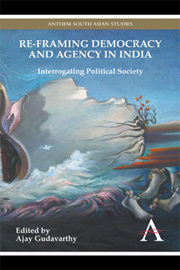Book contents
- Frontmatter
- Contents
- Preface and Acknowledgements
- List of Tables
- Chapter 1 Introduction: Why Interrogate Political Society?
- Part I Political Society and Protest Politics
- Chapter 2 Political Society in a Capitalist World
- Chapter 3 Antinomies of Political Society – Implications of Uncivil Development
- Chapter 4 Civil Society and the Urban Poor
- Chapter 5 Contentious Politics and Civil Society in Varanasi
- Chapter 6 The Politics of a Political Society
- Part II Political Society, Middlemen and Mobility
- Part III Civil Society and/or Political Society
- Part IV Rejoinder
- List of Contributors
Chapter 3 - Antinomies of Political Society – Implications of Uncivil Development
from Part I - Political Society and Protest Politics
Published online by Cambridge University Press: 05 June 2012
- Frontmatter
- Contents
- Preface and Acknowledgements
- List of Tables
- Chapter 1 Introduction: Why Interrogate Political Society?
- Part I Political Society and Protest Politics
- Chapter 2 Political Society in a Capitalist World
- Chapter 3 Antinomies of Political Society – Implications of Uncivil Development
- Chapter 4 Civil Society and the Urban Poor
- Chapter 5 Contentious Politics and Civil Society in Varanasi
- Chapter 6 The Politics of a Political Society
- Part II Political Society, Middlemen and Mobility
- Part III Civil Society and/or Political Society
- Part IV Rejoinder
- List of Contributors
Summary
The interrelation between the state, civil society and more recently, political society, notwithstanding the differences over what constitutes each of the domains, has singularly emerged as the most significant area of study in comprehending the process of democratization. Post the East European debacle, civil society has for long been projected and trusted as an all-encompassing panacea for most of the problems plaguing the developing societies. It is an imaginary political entity that is carved out to stand for various values that are actively pursued through varied institutions. Civil society has become a kind of ‘aspirational shorthand’ for the ideas/values of equity, deepening participation, public fairness, individual rights, tolerance, trust, legality, cooperation and informed citizenry (Elliot 2004). These ideals are fostered and protected by voluntary associational activity occurring independently or ‘outside’ of the state, including in wide-ranging associations or institutions such as clubs, religious bodies, sabhas and samajs, unions, professional associations, community action groups, non-governmental organizations (NGOs), media agencies, research institutes and youth organizations to name a few (ibid.). Civil society, therefore, seemed like a radical alternative in state-regulated societies. However, after the initial euphoria died out, scholars began to raise serious doubts about the scope and nature of the autonomy of civil society and its implications for the process of democratization. For instance, the emphasis on trust (one of the most significant markers of a civil society) in situations of marked inequality not only offers a false promise to the poor but also robs them of their right to struggle and protest (Edwards 2000).
- Type
- Chapter
- Information
- Re-framing Democracy and Agency in IndiaInterrogating Political Society, pp. 49 - 72Publisher: Anthem PressPrint publication year: 2012

